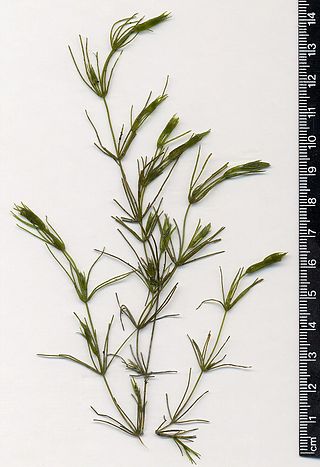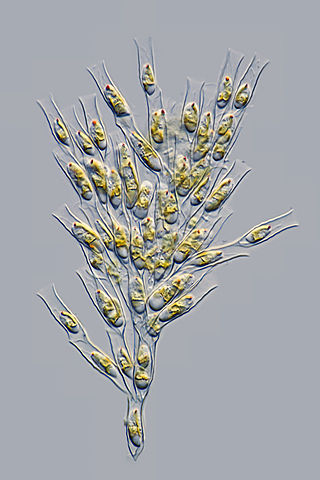
Charales is an order of freshwater green algae in the division Charophyta, class Charophyceae, commonly known as stoneworts. Depending on the treatment of the genus Nitellopsis, living (extant) species are placed into either one family (Characeae) or two. Further families are used for fossil members of the order. Linnaeus established the genus Chara in 1753.

The Chrysophyceae, usually called chrysophytes, chrysomonads, golden-brown algae or golden algae are a large group of algae, found mostly in freshwater. Golden algae is also commonly used to refer to a single species, Prymnesium parvum, which causes fish kills.

AlgaeBase is a global species database of information on all groups of algae, both marine and freshwater, as well as sea-grass.

Ectocarpales is a very large order in the brown algae. The order includes families with pseudoparenchymatous (Splachnidiaceae) or true parenchymatous (Scytosiphonaceae) tissue. Pseudoparenchymatous refers to a filamentous alga with cells packed very close together to give an appearance of parenchymatous tissue, the latter being composed of cells which can truly divide in three dimensions, unusual among the algae. Filamentous algae are composed of cells that divide along a single plane, allowing only elongation to form filaments of one or more rows of cells. Algae that can divide in two planes can form sheet-like thalli or bodies. Cells that can divide in a third plane potentially allow for the organism to develop a more complex body plan, and diversification of body plans into an erect thallus of some sort and a holdfast for attaching the upright portion to the substrate.

The raphidophytes, formally known as Raphidomonadea or Raphidophyceae, are a small group of eukaryotic algae that includes both marine and freshwater species. All raphidophytes are unicellular, with large cells, but no cell walls. Raphidophytes possess a pair of flagella, organised such that both originate from the same invagination. One flagellum points forwards, and is covered in hair-like mastigonemes, while the other points backwards across the cell surface, lying within a ventral groove. Raphidophytes contain numerous ellipsoid chloroplasts, which contain chlorophylls a, c1 and c2. They also make use of accessory pigments including β-carotene and diadinoxanthin. Unlike other heterokontophytes, raphidophytes do not possess the photoreceptive organelle typical of this group.

Eustigmatophytes are a small group of eukaryotic forms of algae that includes marine, freshwater and soil-living species.

Aphanochaetaceae is a family of algae in the order Chaetophorales.

Caulerpaceae is a family of green algae in the order Bryopsidales.

Chaetophoraceae is a family of green algae in the order Chaetophorales.
Pycnococcaceae is a family of green algae in the order Pseudoscourfieldiales. The defining features of this family include the single invagination of the pyrenoid where the mitochondrial membrane fits into it and the "decapore" - a ring of 10 pores through the thick cell wall.
Sykidion is a genus of green algae. Pseudoneochloris is a synonym of this genus. As of March 2022, Sykidion was the only genus in the family Sykidiacaeae, which was the only family in the order Sykidiales.
Mesostigma is a genus of freshwater green algae, with a single species Mesostigma viride. As of February 2022, AlgaeBase classified it as the only genus in the family Mesostigmataceae, the only family in the order Mesostigmatales, the only order in the class Mesostigmatophyceae. It is now considered to be one of the earliest diverging members of green plants/algae (Viridiplantae).

Dictyochophyceae sensu lato is a photosynthetic lineage of heterokont algae.

Oxyrrhis is a genus of dinoflagellates. It includes the species Oxyrrhis marina.
Chrysomerophyceae is a monotypic class of photosynthetic heterokont eukaryotes.
Picophagea, also known as Synchromophyceae, is a class of photosynthetic heterokonts. The chloroplast of the Synchromophyceae are surrounded by two membranes and arranged in a way where they share the outer pair of membranes. The entire chloroplast complex is surrounded by an additional two outer membranes.

Cyanidiophytina is a subdivision of red algae.

Michael Dominic Richard Guiry, is an Irish botanist, who specialises in phycology (algae). See for example the articles. He is the founder and director of the algal database, AlgaeBase.














